|
|
|
Sort Order |
|
|
|
Items / Page
|
|
|
|
|
|
|
| Srl | Item |
| 1 |
ID:
106797
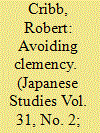

|
|
|
|
|
| Publication |
2011.
|
| Summary/Abstract |
Like other Allied powers in Asia, the Netherlands Indies government embarked on the trial of Japanese military personnel accused of war crimes during the occupation of the Indonesian archipelago. Although calls for clemency towards convicted war criminals were heard as early as 1947, the Dutch authorities resisted the suggestion that prisoners be released or repatriated. Many Dutch residents of the former colony remained bitter about Japanese crimes during the occupation. They also blamed Japanese policies for the insurgent Republic of Indonesia, which at times after its independence declaration in August 1945 controlled large parts of the archipelago. Whereas the rise of communist insurgency in other parts of Southeast Asia, and the broader context of the Cold War, rapidly diminished in those regions the importance of keeping war criminals imprisoned, the Dutch saw their war against the Republic as a continuation of the war against Japan and saw the continued detention of war criminals as essential. When military, diplomatic and political weakness forced the Dutch to recognize Indonesian independence in December 1949, one of their last acts was to arrange the transfer of the remaining imprisoned war criminals to Sugamo Prison in Japan.
|
|
|
|
|
|
|
|
|
|
|
|
|
|
|
|
| 2 |
ID:
129519
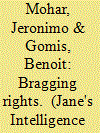

|
|
|
| 3 |
ID:
100215


|
|
|
| 4 |
ID:
123198


|
|
|
|
|
| Publication |
2013.
|
| Summary/Abstract |
THE GROWING instability in Egypt's Sinai Peninsula represents one of the most dangerous, and most anticipated, crises in the Middle East. Even before the 2011 Egyptian revolution, the security vacuum in the Sinai allowed criminals and terrorists, including those with an ideology akin to Al Qaeda's, to expand their operations. In the chaos after the revolution, these problems have worsened. Meanwhile, various Palestinian groups use the Sinai as a launching pad for attacks against Israel.
|
|
|
|
|
|
|
|
|
|
|
|
|
|
|
|
| 5 |
ID:
093932
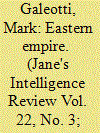

|
|
|
| 6 |
ID:
126320
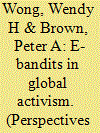

|
|
|
|
|
| Publication |
2013.
|
| Summary/Abstract |
In recent years, WikiLeaks and Anonymous have made headlines distributing confidential information, defacing websites, and generating protest around political issues. Although many have dismissed these actors as terrorists, criminals, and troublemakers, we argue that such actors are emblematic of a new kind of political actor: extraordinary bandits (e-bandits) that engage in the politics of no one via anonymizing Internet technologies. Building on Hobsbawm's idea of the social bandit, we show how these actors fundamentally change the terms of global activism. First, as political actors, e-bandits are akin to Robin Hood, resisting the powers that be who threaten the desire to keep the Internet free, not through lobbying legislators, but by "taking" what has been deemed off limits. Second, e-banditry forces us to think about how technology changes "ordinary" transnational activism. Iconic images of street protests and massive marches often underlie the way we as scholars think about social movements and citizen action; they are ordinary ways we expect non-state actors to behave when they demand political change. E-bandits force us to understand political protest as virtual missives and actions, activity that leaves no physical traces but that has real-world consequences, as when home phone numbers and addresses of public officials are released. Finally, e-banditry is relatively open in terms of who participates, which contributes to the growing sense that activism has outgrown organizations as the way by which individuals connect. We illustrate our theory with the actions of two e-bandits, Anonymous and WikiLeaks.
|
|
|
|
|
|
|
|
|
|
|
|
|
|
|
|
| 7 |
ID:
151798
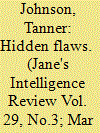

|
|
|
| 8 |
ID:
123523
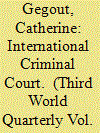

|
|
|
|
|
| Publication |
2013.
|
| Summary/Abstract |
The International Criminal Court ( icc ) aims to promote not only justice, but also peace. It has been widely criticised for doing neither, yet it has to contend with some severe structural and political difficulties: it has limited resources, it faces institutional restrictions, it is manipulated by states, and it is criticised for an alleged selectivity in the way it dispenses justice. However, the icc could contribute significantly to the promotion of international justice and peace, and have a major impact on the prevention of crime, since its prosecutions represent a clear threat to highly placed individuals who commit serious crimes. While this article concentrates on the work of the icc in Africa, the only continent where it has issued indictments against suspected criminals, it also looks at its efforts on other continents. It argues that, in the larger international context, the contribution of the icc to international justice and peace depends on its institutional power and the support it receives from states, on its own impartial work, and on the way it is perceived by potential criminals and victims in the world.
|
|
|
|
|
|
|
|
|
|
|
|
|
|
|
|
| 9 |
ID:
095158
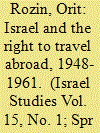

|
|
|
|
|
| Publication |
2010.
|
| Summary/Abstract |
Today, no one questions that criminals, minors, or those seeking to shirk their civic duties may be restricted or even barred from leaving their respective countries. However, during the 1950s, several democratic countries, including Israel, restricted foreign travel by their citizens on other grounds. This article examines the right of departure policies of Israel in comparison with three models-Soviet, British, and American-which served Israeli policy makers as criteria in this regard. The policy promulgated by a country sheds light on its character, its society, and its perception of citizenship. The article not only describes the right to travel abroad as exercised in Israel, but also opens a window onto the conceptual world of those who set such policy.
|
|
|
|
|
|
|
|
|
|
|
|
|
|
|
|
| 10 |
ID:
077344
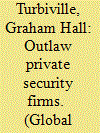

|
|
|
|
|
| Publication |
2006.
|
| Summary/Abstract |
The thousands of large and small private security establishments operating around the world today continue to expand in number, diversity, and capability. Government oversight is often lacking, and the impact on local, national and regional security and stability may be substantial. In the most troubled areas, the pockets of security provided by private security regimens provide may mean the difference between a failed state and one that is at least faltering. However, the advantages of "private security firm cover" quickly became evident to criminals and groups with terrorist agendas as well. This assessment addresses numerous cases from around the world of private security establishments that were either formed for - or otherwise turned to - the pursuit of criminal or terrorist purposes. The stated jihadist intent to infiltrate such companies underscores the need for law enforcement and intelligence attention to the recruiting, affiliations and activities of these security enterprises
|
|
|
|
|
|
|
|
|
|
|
|
|
|
|
|
| 11 |
ID:
106798
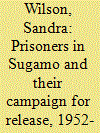

|
|
|
|
|
| Publication |
2011.
|
| Summary/Abstract |
The great majority of Japanese war criminals served part or all of their sentences in Sugamo Prison in Tokyo, either because they had been tried in Japan, or after repatriation from overseas. Once convicted, they tended to be invisible in historical accounts of the post-war period, but in fact they were not cut off from Japanese society or politics in the 1950s. Rather, Sugamo's inmates worked hard to win public sympathy, also exerting considerable pressure on the government in an attempt to hasten their own release and to have Japanese prisoners repatriated from overseas gaols. The early 1950s were crucial, not least because the 1952 peace treaty stipulated that the countries that had originally prosecuted them retained the right to decide on prisoners' fates even after Japan regained its sovereignty. Moreover, convicted war criminals were increasingly concentrated in Sugamo, allowing many opportunities for political activity and other campaigning. Though the last war criminals were not freed until 1958, prisoners' activities in the early 1950s played an important part in changing the terms in which discussion of war criminals took place and thus in making it more and more difficult for foreign governments to maintain their original stance on war criminals.
|
|
|
|
|
|
|
|
|
|
|
|
|
|
|
|
| 12 |
ID:
057666
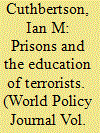

|
|
|
| 13 |
ID:
037976
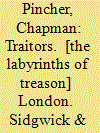

|
|
|
|
|
| Publication |
London, Sidgwick & Jackson, 1987.
|
| Description |
xvii, 346p
|
| Standard Number |
0283993790
|
|
|
|
|
|
|
|
|
|
|
|
Copies: C:1/I:0,R:0,Q:0
Circulation
| Accession# | Call# | Current Location | Status | Policy | Location |
| 028394 | 364.131/PIN 028394 | Main | On Shelf | General | |
|
|
|
|
| 14 |
ID:
149875
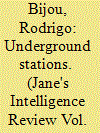

|
|
|
|
|
| Summary/Abstract |
The high public profile of the theoretically anonymous Tor network has made it a key target for law enforcement. As Tor-related arrests and takedowns multiply, Rodrigo Bijou examines how other privacy platforms and networks may come to take its place.
|
|
|
|
|
|
|
|
|
|
|
|
|
|
|
|
| 15 |
ID:
122294
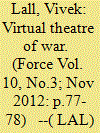

|
|
|
|
|
|
|
|